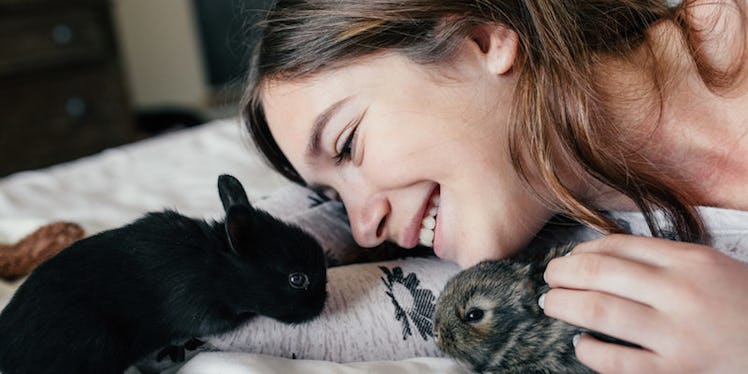
5 Lifestyle Changes That Can Make A Difference For Animals Everywhere
I think it's safe to say most people consider themselves animal lovers. If your Facebook feed looks anything like mine, it's filled with a mix of cute pet photos, inspirational animal rescue stories and petitions calling for justice for animals like Cecil the lion.
While social media activism has the important and meaningful impact of raising awareness, we can do better than merely sharing a post and moving on with our day. Sure, many people simply don't have the time to spend hours each week volunteering at their local animal shelters.
The good news is, there are day-to-day actions we can take that have a real and positive impact on animals. Through these actions, we can progress from being animal lovers to animal advocates:
1. Live a cruelty-free lifestyle.
Abstaining from cosmetic products that are tested on animals is the simplest way to make a huge difference in the lives of many. Any cosmetic item that is tested on animals has a counterpart of equal or better quality that isn't tested on animals.
While other countries across the world are slowly banning this cruel practice, American cosmetic companies still have a choice. Choose to be on the right side of history. This guide serves as a great introduction to finding cruelty-free cosmetics anywhere you go.
2. Adopt. Don't buy.
Not all of us are in the market for a new pet. But if you are, consider adopting a homeless animal rather than buying one from a breeder. This time of year, every shelter is overflowing with dogs, cats, puppies and kittens of all ages, breeds and personalities.
There is a common saying in the animal sheltering system. When you adopt an animal, you save two lives: the life of the animal you adopted and the life of the animal that will take its place. On the flip side, when you buy from a breeder, you support an industry that contributes to pet overpopulation and ultimately feeds into the shelter system.
I consider myself lucky to live in Austin, which is the largest no-kill city in the United States. But Austin didn't get here overnight. This was achieved through the collaboration of all the area shelters and residents by them volunteering, fostering, fundraising and – arguably most importantly – adopting.
3. Give wildlife a chance.
Many people don't think they can do anything to help when they encounter injured or abandoned wildlife. So, they just say, “OMG, poor thing,” and look the other way.
The commonly repeated myth that baby animals get abandoned by their parents if you touch them doesn't help. There are many ways you can play a role in existing peacefully with wildlife.
If you don't have a wildlife rescue in your area, a quick Google search will yield independent, qualified and licensed wildlife rehabbers. These organizations or individuals can assess over the phone if an animal is truly in need of help, or if you're just dealing with a baby bird that's taking a break while learning to fly.
If the animal truly is in need of help, don't worry. You're not going to be asked to rehabilitate a wild animal all by yourself. That's actually illegal in most places. The most you will have to do is drop the animal off to the rescuer.
4. Visit sanctuaries, instead of zoos or circuses.
While most people consider observing exotic animals entertaining and educational, in many cases, the venues that allow this exploit the animals. In circuses, the animals are forced to perform unnatural – and sometimes dangerous – acts just to entertain the attendees.
Meanwhile, zoo animals live in unnatural settings, and families are often broken up due to trades among zoos. While not all zoos engage in the same practices, when in doubt, err on the side of not funding the use of animals for entertainment.
If you really want to get your exotic animal fix, tour a sanctuary for rescued animals. Or better yet, volunteer at one.
5. Reduce your meat consumption.
It won't happen cold turkey for everyone, but striving to observe a plant-based lifestyle saves the lives of hundreds of animals by reducing the demand for meat. As any animal lover knows, animals — even pigs, cows and chickens — are sentient beings that desire to live and socialize.
Millennials are making waves as an increasing number of them are beginning to identify as some variation of vegan or vegetarian. After the initial adjustment period, observing a plant-based diet is easy, budget-friendly and healthy. With the Ben & Jerry's introduction of a delicious new line of dairy-free ice cream, there is no better time to take the plunge.
While the idea of changing your lifestyle can be daunting, know that when it comes to aligning your animal-loving nature with your lifestyle, the benefits far outweigh the minor inconveniences.